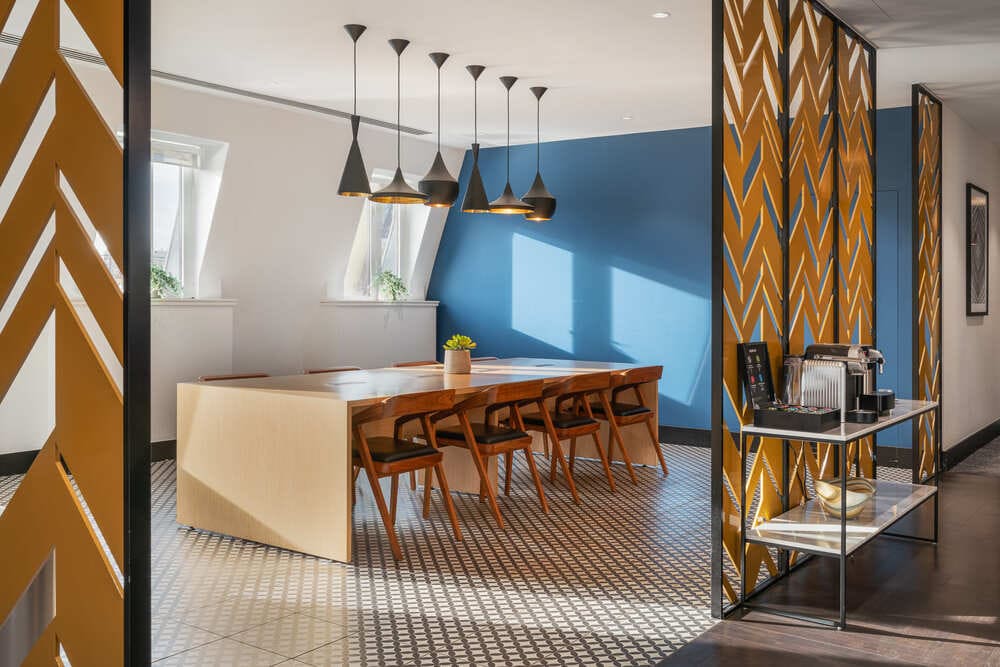Table of Contents
Imagine a vibrant hub where innovation meets flexibility, and professionals from diverse backgrounds come together to work, collaborate, and thrive. This is the essence of a coworking space – a modern solution to the evolving needs of today’s dynamic workforce. As London’s premier provider of prime office locations, we’ve witnessed firsthand the revolutionary impact of coworking spaces on how businesses operate and grow. But what exactly is coworking space, and why has it become the talk of the town among entrepreneurs, freelancers, and even established corporations seeking to shake up their work environment?
Defining Coworking Space
Unlike traditional offices, coworking spaces bring together individuals and small teams from different industries all under one roof. These spaces typically feature a mix of open-plan hot desks, workstations, and communal areas, all designed to foster a culture of productivity and collaboration.
In bustling London, where real estate comes at a premium, coworking spaces offer access to prime locations that might otherwise be out of reach for smaller businesses. They provide professional meeting rooms, high-speed internet, and other essential amenities, allowing members to present a polished image to clients without the associated costs.
As the nature of work continues to evolve, coworking spaces are at the forefront of shaping the future of office space. They’re not just about providing a desk and a chair – they’re about creating an environment that inspires creativity, facilitates connections, and empowers professionals to work on their terms.
The Concept of Shared Workspaces – History of Coworking
The idea of coworking spaces began to take shape in the late 1980s and early 1990s, driven by advancements in technology and changing work patterns. As personal computers became more prevalent and the internet started to reshape how we communicate and collaborate, the traditional office model began to evolve.
One of the earliest precursors to modern coworking spaces was the “hackerspace.” These community-operated workspaces emerged in the mid-1990s, primarily in Europe. They provided a physical location where people with common interests, often in computers, technology, science, or digital art, could meet, socialise, and collaborate.
However, the coworking movement as we know it today is often credited to Brad Neuberg, who started the first official coworking space in San Francisco in 2005. Neuberg’s space, called the “San Francisco Coworking Space,” was a reaction to what he saw as a choice between working for a company in a structured environment or working from home in isolation. He aimed to create a third option that combined the structure and community of an office with the freedom and independence of freelancing.
This concept quickly gained traction, particularly among tech startups, freelancers, and remote workers. The idea spread rapidly, with early adopters opening spaces in major cities around the world. By 2008, there were about 160 coworking spaces globally. This number exploded over the next decade, reaching over 18,000 by 2018. The growth of shared workspaces was further accelerated by the 2008 financial crisis, leading to increased freelancing and entrepreneurship. As more people sought flexible, cost-effective alternatives to traditional offices, the coworking model gained momentum.
Today, shared workspaces have evolved into a diverse ecosystem, ranging from small, independent spaces to large, global networks. Flexible office space has become integral to the modern work landscape, reflecting broader shifts towards flexibility, collaboration, and community in professional life.
How Coworking Differs from Traditional Offices
So what is coworking space, and how does it compare to a traditional office set-up?
Coworking spaces and traditional offices represent two distinct approaches to work environments, each with its own characteristics. Conventional office spaces are often more uniform and company-specific in design and structure, whilst coworking spaces are dynamic and varied with a mix of open areas and communal zones.
The Benefits of Coworking Spaces
Coworking spaces can provide an energetic and productive environment you might not experience while working from a home office or a cafe. Being in a coworking environment with other driven workers not only creates a sense of community and camaraderie but can also enhance your own focus. Leaving the isolation of a home office and travelling to a coworking space can help you establish a schedule and prevent slipping into a sluggish work routine. Here are the main advantages of coworking:
- Flexible Working
Coworking spaces offer flexible membership options and the opportunity for members to scale their space needs accordingly. - Networking
Coworking spaces foster a diverse collection of professionals from various industries and different companies which encourages networking and collaboration. Traditional office space presents fewer opportunities for external networking. - Affordability
Coworking spaces are often more cost-effective for small teams or individuals, with utilities and services included in membership fees. The ultimate in cost saving. - Professionalism
Coworking spaces are often equipped with high-end facilities such as hot desks, video call booths, lounge space, lightning-fast internet, and stylish meeting rooms that are well suited to nurturing most aspects of modern work. Driven by a desire to provide businesses with a sophisticated place to work, meet, and host events, every element of our beautiful coworking spaces in London creates a lasting impression on our customers and their guests.
Types of Coworking Spaces in London
Here at Argyll, we go above and beyond to support your business needs, and the exceptionally high quality of our coworking spaces reflects this. With our iconic coworking locations across London, we are sure we have the right solution for you or your organisation.
Each property offers an exceptional central London location with excellent transport links. Work close to clients one day and close to your favourite social scene the next. Choose one with a breathtaking roof terrace for outdoor thinking or one with secure bike parking if you want to ride in. This is the ultimate in flexibility.
Open Plan Coworking Areas
Open-plan coworking areas are the heart of most coworking spaces, embodying the core principles of flexibility, collaboration, and community that define the movement.
Members can choose different spots each day, depending on their mood or task at hand, and the open layout naturally encourages interactions between members.
Our elegant open-plan coworking spaces in London offer video call booths for privacy and enhanced lighting for your calls, while elegant lounges give you an alternative place to socialise, hot desk, or unwind. From sofas and armchairs to desks and high tables; all of our coworking spaces offer a variety of seating to ensure you are comfortable and ready for a productive day.
Private Offices within Coworking Facilities
Whilst coworking spaces offer plenty of opportunities for networking and collaboration, many shared office spaces complement their open areas with quiet zones, phone booths, and private meeting rooms. This balanced approach aims to provide the benefits of open collaboration while still catering to the needs for privacy and focused work.
Industry-Specific Coworking Spaces
We create exclusive workspaces in London with consistently high standards, designed to give our ambitious customers a place that complements their reputation. These spaces also play a role in fostering innovation within industries by creating hubs where professionals can easily share ideas, collaborate on projects, and stay updated on the latest trends and technologies in their field. Industry-specific coworking spaces focus on creating optimised environments for professionals in a particular field. Beyond providing just a workspace, they offer specialised office equipment, expertise, and networking opportunities relevant to their target industry.
Who Uses Coworking Spaces?
Coworking spaces attract a diverse range of professionals and businesses, reflecting the changing nature of work in the modern economy. From independent professionals to non-profit organisations and large corporations, the appeal of using coworking spaces across these diverse groups is vast.
This diverse user base contributes to the dynamic and innovative atmosphere that characterises many coworking spaces, creating unique opportunities for cross-pollination of ideas and collaborative communities across industries and professions.
The Rise of Coworking in London
As a hotbed for startups and creative industries, as well as a global financial hub, London has embraced the coworking concept with open arms. The rise of coworking in London has been phenomenal, transforming the city’s work landscape over the past decade.
The city’s high real estate costs, coupled with a growing freelance and startup culture, have created the perfect conditions for coworking to thrive. From repurposed warehouses to sleek spaces in the heart of the City, coworking venues have sprouted across every borough, catering to diverse needs and industries.
This boom has been fueled by both homegrown operators and international players, offering everything from hot desks to premium private offices. The flexibility, community aspect, and access to prime locations have made coworking an attractive option not just for small businesses and freelancers, but increasingly for corporate teams seeking innovation and flexibility. As London continues to evolve as a global business centre, coworking spaces have become an integral part of its professional ecosystem, reflecting the city’s dynamic, diverse, and forward-thinking ethos.
How to Choose the Right Coworking Space in London
Choosing the best coworking space in London requires careful consideration to ensure it aligns with your needs and work style.
Start by defining your priorities: location, budget, amenities, and the type of community you seek. Consider the space’s accessibility via public transport and proximity to clients or partners. Evaluate the range of coworking membership options, from hot desks to private spaces, ensuring they offer the flexibility you need. Look into the amenities provided, such as high-speed internet, meeting rooms and event spaces.
It may be useful to visit during peak working hours to gauge the atmosphere and network with current members. Make sure to pay attention to practical aspects like noise levels, natural light, and the quality of common areas.
Finally, consider the reputation and stability of the coworking provider, especially if you’re planning a long-term arrangement. By weighing up these factors, you can find a coworking space in London that not only meets your practical needs but also enhances your professional growth and work satisfaction.
Our Coworking Spaces in London
Beautiful buildings. Prestigious locations. Exceptional service. These three foundations have shaped our signature experience for over 25 years. Our coworking members enjoy exclusive workspaces in London’s finest neighbourhoods.
Every workday is different, so why be tied to one desk in one location? Hot desk in London and you can choose the right environment for the moment. Choose from a private booth, shared table, relaxed lounge sofa or open-plan hot desk. Or take a seat in one of our gardens, courtyards or roof terraces – the perfect physical space. Take advantage of the flexibility to work from one of our 11 exceptional shared workspaces – as often as you’d like, for as long as you like, from £395 a month. Choose to base yourself in any of our stylish properties for the day, and you can also invite up to two guests for meetings in our coworking or lounge areas.
Our effortlessly stylish coworking spaces are in properties chosen for their charm and elegance. You’ll have a prestigious London address and use of our lounges and kitchens – some even offer gardens or roof terraces which are great for social events! We ensure you and your team are always looked after with attentive service.
What are you waiting for? Get in touch today, and let us introduce you to our collection of inspiring coworking spaces in London.




